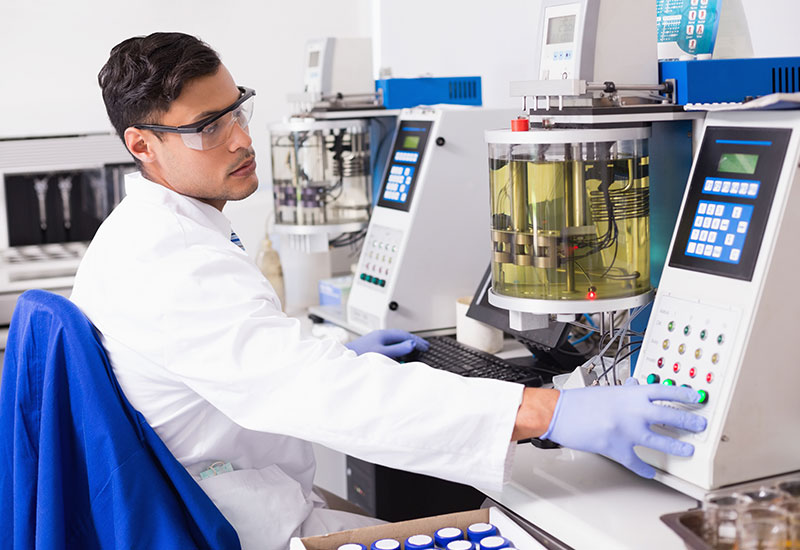What is ERP for Lab Equipment?
ERP for lab equipment is a specialized software that integrates the core functions of a lab equipment manufacturing company into a single unified system and provides visibility across different operations for better business agility.
With an ERP software dedicated to lab equipment manufacturing, businesses can align their resources efficiently, improve lead times, optimize reorder points, and adapt to changing market dynamics. It automates various labor-intensive & error-prone tasks and provides detailed audit trails, simplifying the stringent compliance process.
Overview of the Lab Equipment Industry
According to the industry research conducted by the MarketResearchFuture portal, India’s lab equipment manufacturing market is estimated to be $3.29 billion in size. It is expected to reach $9.2 billion by 2035 with a CAGR of 8.37% during the forecasted ten-year period of 2025-2035.
There are several factors believed to contribute to the growth of the laboratory equipment industry. These include: India’s rising national scientific and technological capabilities, a surge in research of pharma & healthcare instruments, and an increasing focus on industry-driven research.
You may also like: What are Inventory valuation methods and their importance?
Challenges Faced by Lab Equipment Industry in India
-
Rapid Technological Advancements
Modern technological advancements have revolutionized the lab industry. They provide increased accuracy and speed up performance. In order to stay updated with the latest technological advancements, lab equipment manufacturers have to consistently invest in research and talented manpower.
-
Rising Material Costs
Many raw materials, such as copper, steel, and plastic, are the building blocks of our everyday products. Due to hikes in their prices, lab equipment manufacturers often face supply chain crises. Increased manufacturing costs lead to lower profitability and an increase in the price of the final products (lab equipment).
-
Complex Regulatory Requirements
Manufacturers of lab equipment have to strictly adhere to regulations enforced by local regulatory bodies to avoid heavy sanctions, penalties, or legal proceedings. With time, these regulations keep increasing. Staying compliant with all of them can be a challenging task. Manufacturers have to be agile, stay up-to-date with the latest regulatory changes, and find ways to stay responsive at all times.
-
Global Competition
Globalization has opened up new markets and opportunities. However, manufacturers of laboratory equipment are faced with a dual challenge from both domestic and international rivals. There are several low-cost manufacturers of lab equipment who sell their products at competitive prices. As a result, manufacturers are under extreme pressure to make their products innovative, add a wider range of new features, and lower prices.
-
Skilled Labor Shortage
As a company grows, they have to hire an adequate skilled labor force for higher productivity. However, a lack of skilled labor can lead to declined production, delayed projects, missed deadlines, and increased operational costs. The business can also suffer from a lack of innovation and lower product quality, which can ultimately damage the brand’s identity.
Benefits of ERP for Lab Equipment
-
Single Source of Information
One of the prime benefits of ERP is that it acts as a centralized database for all critical organizational information. Manufacturing is an expensive activity that includes several operational costs such as labor costs, material procurement costs, processing costs, and so on. ERP system help in recording all the transactions related to manufacturing, right from the bill of materials to the final output, in a single system.
-
Enhanced Stock Monitoring
ERP helps with inventory management, both batch-wise and lot-wise. The inventory module in ERP builds a single database that contains the name, description, location, and other information about various inventories. As a result, decision-makers get a real-time view of the quantity of various items, and locating them becomes easier. Moreover, it also helps the company keep an eye on expensive and highly explosive items using various inventory management methods like FIFO.
-
Optional Field
ERP has a feature called “Optional Field,” which helps businesses check the income and expenses incurred on the manufacturing of different products such as glassware and plasticware. They can keep the costs under control, analyze the cost-to-conversion ratio, and forecast future sales trends.
-
Improved Data Accuracy
In an organization, the data may come from a variety of sources. Inaccurate data could cost your business in various ways, such as increased costs, reduced revenue, reputation damage, and compliance issues. ERP combines data from different sources, such as vendors, clients, and employees, in real time and eliminates manual data entry errors. Thus, decision-makers get easy access to data from reliable sources.
-
Barcode and RFI Tracking
The Barcode and Radio Frequency Identification (RFI) feature in business management tools creates a unique identifier for each piece of equipment and records it in a central database. This increases operational efficiency and allows accurate tracking of items using Barcode and RFI Readers.
-
Procurement
ERP is equipped with a procurement management system that is capable of generating automated electronic purchase orders. It expedites the raw material procurement process and reduces the need for human intervention. It also simplifies vendor management and allows easier tracking of shipments. Decision-makers can make informed decisions by comparing vendor performance and identifying areas for improvement.
-
Asset Register
The asset tracking system centralizes the asset data and gives valuable insights into the assets, such as name, status, date of procurement, purchase price, and current value after depreciation. It also automates asset scheduling and work order management and generates automated reports about asset performance, usage, and expenses. As a result, it becomes easier to accurately and efficiently manage the assets throughout their life cycle.
Future Trends of ERP for Lab Equipment
-
Artificial Intelligence
One of the key trends in the ERP industry is the use of AI. The lab equipment industry increasingly uses AI for huge data analysis, which ultimately results in accurate decision-making. It can identify patterns and trends that may be missed by humans. It helps optimize workflows, identify bottlenecks, and correct inefficiencies.
-
Automation
Automation is the use of technological advancements to perform specific operations that were traditionally performed by humans. It helps improve accuracy, safety, and efficiency. It is increasingly used in various industries like lab equipment, manufacturing, and healthcare.
-
Sustainability
Another trend in the laboratory equipment industry is the use of sustainable technology, such as the development of energy-efficient, environmentally friendly equipment that doesn’t release hazardous or polluting chemicals.
You may also like: ERP for Chemical Industry
Gain Precision in Lab Equipment Manufacturing with Sage X3
ERP software for lab Equipment guides the companies in every aspect of laboratory management to maintain compliance with regulatory bodies, implement utmost safety and accuracy, and coordinate between different departments and facilities.
Sage X3 is an innovative solution that provides robust management of nearly every lab equipment business function. It easily integrates with payroll, POS, and other systems for seamless tracking and operations. It is fully scalable and provides comprehensive information in interactive reports with minimal effort.
Frequently Asked Questions (FAQs)
1. What is ERP Software for Lab Equipment?
ERP for lab equipment is an enterprise-level solution that automates key aspects of the lab equipment industry, such as production planning, material management, workflow optimization, quality control, compliance & certification, and sales reporting & profitability analysis, among others.
2. What is the best ERP for lab equipment industry?
Sage X3 is the best ERP for lab equipment industry that provides a comprehensive set of modules to deal with industry-specific challenges, improve efficiency, and foster better decision-making. This best-in-class Enterprise Resource Planning system provides a single platform to manage your multiple branches, gain advanced inventory tracking & reporting capability, automate reorder alerts, streamline compliance checks, and improve supplier relationships.
3. What are the key features of ERP for lab equipment?
Here are the key features of the lab equipment ERP:
- Procurement Management: Streamlined order processing & tracking, and vendor relationship management
- Quality Control: Automated quality checks at every level to provide a high-quality & standardized experience
- Data Consolidation: Automated data collection and consolidation for comprehensive reporting & analysis
- Reporting: Real-time equipment repair & maintenance tracking for better efficiency
- Multi-company: Supports multiple labs or branches from a unified interface






